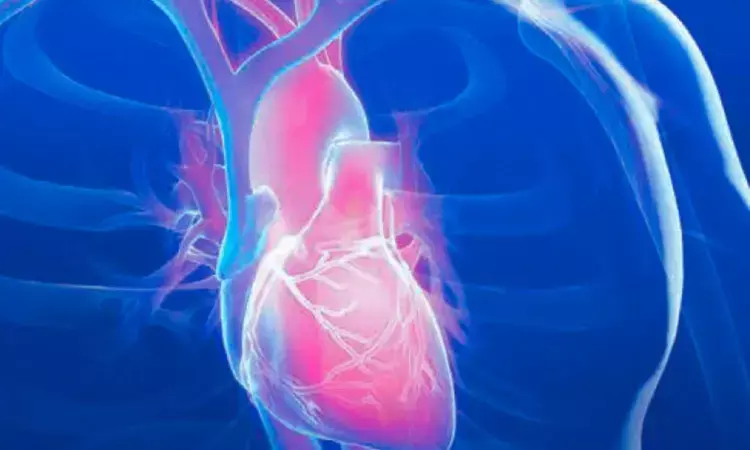- Home
- Medical news & Guidelines
- Anesthesiology
- Cardiology and CTVS
- Critical Care
- Dentistry
- Dermatology
- Diabetes and Endocrinology
- ENT
- Gastroenterology
- Medicine
- Nephrology
- Neurology
- Obstretics-Gynaecology
- Oncology
- Ophthalmology
- Orthopaedics
- Pediatrics-Neonatology
- Psychiatry
- Pulmonology
- Radiology
- Surgery
- Urology
- Laboratory Medicine
- Diet
- Nursing
- Paramedical
- Physiotherapy
- Health news
- Fact Check
- Bone Health Fact Check
- Brain Health Fact Check
- Cancer Related Fact Check
- Child Care Fact Check
- Dental and oral health fact check
- Diabetes and metabolic health fact check
- Diet and Nutrition Fact Check
- Eye and ENT Care Fact Check
- Fitness fact check
- Gut health fact check
- Heart health fact check
- Kidney health fact check
- Medical education fact check
- Men's health fact check
- Respiratory fact check
- Skin and hair care fact check
- Vaccine and Immunization fact check
- Women's health fact check
- AYUSH
- State News
- Andaman and Nicobar Islands
- Andhra Pradesh
- Arunachal Pradesh
- Assam
- Bihar
- Chandigarh
- Chattisgarh
- Dadra and Nagar Haveli
- Daman and Diu
- Delhi
- Goa
- Gujarat
- Haryana
- Himachal Pradesh
- Jammu & Kashmir
- Jharkhand
- Karnataka
- Kerala
- Ladakh
- Lakshadweep
- Madhya Pradesh
- Maharashtra
- Manipur
- Meghalaya
- Mizoram
- Nagaland
- Odisha
- Puducherry
- Punjab
- Rajasthan
- Sikkim
- Tamil Nadu
- Telangana
- Tripura
- Uttar Pradesh
- Uttrakhand
- West Bengal
- Medical Education
- Industry
Kidney Function Decline Identified as Key Mortality Risk Marker in Transthyretin Amyloid Cardiomyopathy: JAMA

UK: A recent retrospective cohort study has highlighted the critical role of kidney function in patients diagnosed with transthyretin amyloid cardiomyopathy (ATTR-CM). The findings, published in JAMA Cardiology, revealed that a decline in kidney function is not only common among these patients but also serves as a significant predictor of mortality, even after accounting for other well-established markers of disease progression.
"Declining estimated glomerular filtration rate (eGFR) serves as a standalone indicator of ATTR-CM disease progression, offering valuable insights for optimizing treatment strategies in clinical practice," the researchers wrote.
ATTR-CM, a rare and progressive condition characterized by the deposition of amyloid fibrils in the heart, has traditionally been evaluated primarily through cardiac-specific parameters. Chronic kidney dysfunction is linked to poorer outcomes, yet the impact of changes in kidney function over time on prognosis remains unclear. To clarify the same, Adam Ioannou, National Amyloidosis Centre, Royal Free Hospital, University College London, London, United Kingdom, and colleagues aimed to evaluate the prognostic significance of a reduction in eGFR within a large cohort of patients with ATTR-CM.
For this purpose, the researchers conducted a retrospective, observational, single-center cohort study of patients diagnosed with ATTR-CM at the National Amyloidosis Centre (NAC) in the UK. The study included individuals who had a baseline eGFR assessment and a follow-up assessment at one year, spanning from January 2000 to April 2024, with data analyzed in June 2024.
The primary outcome was the association between a decline in kidney function, defined as a decrease in eGFR greater than 20%, and the risk of all-cause mortality.
Key Findings:
- Cohort Characteristics:• Among 2001 patients, the mean age was 75.5 years, with 13.1% females.
- Kidney Function Decline:• The median change in eGFR was −5 mL/min/1.73 m².• 24.0% (481 patients) experienced a decline in kidney function (defined as eGFR decrease >20%).
- Genotype and Cardiac Phenotype:• Patients with kidney function decline more frequently had the p.(V142I) genotype (20.6% vs. 13.3%).• They exhibited more severe cardiac involvement at baseline, indicated by:• Higher median NT-proBNP levels (2949 pg/mL versus 2309 pg/mL).• Higher median troponin T levels (0.060 ng/mL versus 0.052 ng/mL).
- Baseline Kidney Function:• The baseline eGFR of those with and without kidney function decline was similar (63 versus 61 mL/min/1.73 m²).
- Mortality Risk:• The decline in kidney function was associated with a 1.7-fold increased risk of mortality (HR, 1.71).• This risk was consistent across the following:• Genotypes:• Wild type: HR, 1.64.• p.(V142I): HR, 1.70.• Non-p. (V142I): HR, 1.51.• NAC disease stages:• Stage 1: HR, 1.69.• Stage 2: HR, 1.69.• Stage 3: HR, 1.61.
- Independent Association with Mortality:• After adjusting for increases in NT-proBNP and outpatient diuretic intensification, the decline in kidney function remained an independent predictor of mortality (HR, 1.48).
In the large cohort of patients with ATTR-CM, a decline in kidney function was a common occurrence and consistently linked to an increased risk of mortality, even after accounting for established markers of cardiac disease progression. Incorporating kidney function decline as an endpoint in contemporary trials could help identify clinically significant and potentially modifiable events earlier in the disease course.
"Combining kidney function decline with established markers such as NT-proBNP progression and outpatient diuretic intensification offers a straightforward and universally applicable model. This approach integrates multiple aspects of the cardiorenal axis into a single scoring system, enabling better identification of patients with rapid ATTR-CM progression who face the highest mortality risk," the researchers concluded.
Reference:
Ioannou A, Razvi Y, Porcari A, et al. Kidney Outcomes in Transthyretin Amyloid Cardiomyopathy. JAMA Cardiol. Published online November 17, 2024. doi:10.1001/jamacardio.2024.4578
Dr Kamal Kant Kohli-MBBS, DTCD- a chest specialist with more than 30 years of practice and a flair for writing clinical articles, Dr Kamal Kant Kohli joined Medical Dialogues as a Chief Editor of Medical News. Besides writing articles, as an editor, he proofreads and verifies all the medical content published on Medical Dialogues including those coming from journals, studies,medical conferences,guidelines etc. Email: drkohli@medicaldialogues.in. Contact no. 011-43720751


